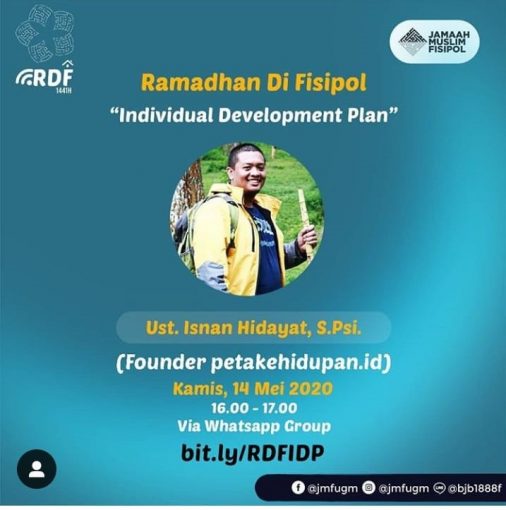
Yogyakarta, May 14th, 2020— Ramadan at FISIPOL (RDF) organized by the Muslim Community of FISIPOL (JMF) UGM held a discussion entitled “Individual Development Plan” with Isnan Hidayat from Petakehidupan.id which talked the “The Rules of Knowing Yourself” online through WhatsApp group chat
The first rule starts with “Comparing will only be an ingratitude”. Isnan furtherly explained that if someone changes because of comparing themselves with others, external motivation will emerge, they only do something to get what others have. “It looks like our performance got better, but it risks making us trapped in feelings of hasad (envy or jealousy) that ultimately makes us never be grateful for the favours we get,” added Isnan.
“No matter how great the work we produce, we will always try to see how other people are also doing. Sometimes, it ended up in seeing people with bigger achievements than us. And at the same time, the masterpiece that we were fighting for seems to lose its meaning because there is a lack of feeling in our hearts,” said Isnan.
So according to Isnan, the intention becomes mandatory to consider from the beginning before creating and contributing. “In the evaluation, after decades of being academics, hundreds of journal articles indexed by Scopus written along with thousands of citations, do not let us become worthless before God because our hearts fulfilled with envy. It turns out that there is a gaping hole in our heart. Feeling inadequate and always comparing is rooted in a sense of ingratitude,” said Isnan.
“That’s why friends, focus on one thing: Be the best version of you. God created us with all the perfection that exist, do not let the glory of the process be blown away in vain because we make the achievement of others as a benchmark of our happiness,” added Isnan.
The second rule is often trapped in a personal branding virus. “We are thrilled to be ugly in the eyes of the public, then choose to show the best even though it is not real and not followed by serious improvements to correct our shortcomings,” said Isnan.
“Without the act of knowing ourselves, we will be trapped in false slogans and false self-image which makes us smug because mesmerized with our self-made masks. From day-to-day, we are less able to recognize our truest self. We need to be critical regarding our social media, for excessively portray ourselves,” explained Isnan.
The third rule highlights about how often we get used to looking for happiness outside ourselves. “As if happiness is a lost item, so we have to go a long way to find it. We forget, that from the beginning happiness has been inherent in us. We just need to realize where it is,” said Isnan.
“If we still determine the thousands of conditions for happiness, we will vulnerable to harm. We create our own laws that don’t physically exist. Commonly said that we have to be rich first and then happy, we have to work with double-digit salaries and then happy, having certain status as the requirement of happiness will end in Quarter Life Crisis,” said Isnan.
“When we feel we have got everything but still empty inside, suffice it by fully knowing yourself because happiness is simple. Whoever knows him, will know his God. That’s what Yahya bin Muadz Ar Razi said,” explained Isnan.
“Finding one’s strength will lead us to find a True Call. Any type of bestowing can be used to predict the destination of the trip. Such as if God bestows upon us the power of sharp analysis, the ability to form arguments, and intelligence in rhetoric, don’t hesitate to be on the sage by being an agitator for social change,” said Isnan.
In the end, Isnan gave the closing statement of the discussion. “God is free from the nature of doing vain deeds, including when God bestowed ourselves with various potentials, there must be a purpose behind it. So understanding the bestow in the form of self-potential is a key factor for the process of self-development. Our task starts from here: finding bestow that God has entrusted to us,” said Isnan closing the discussion attended by 60 participants.
